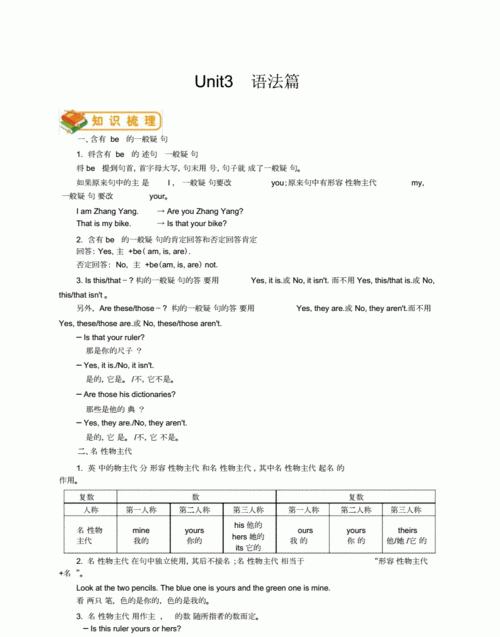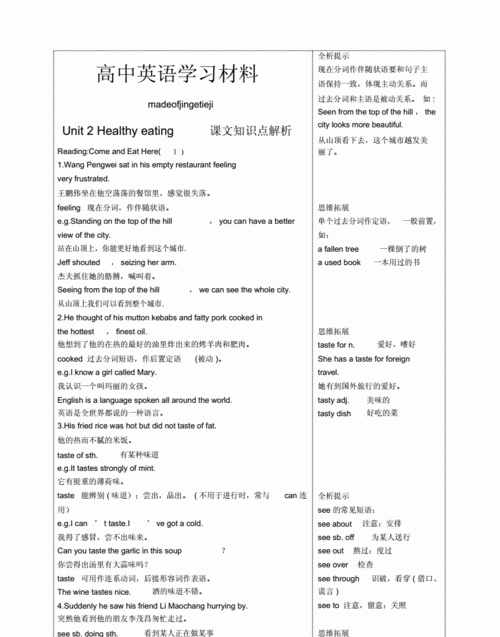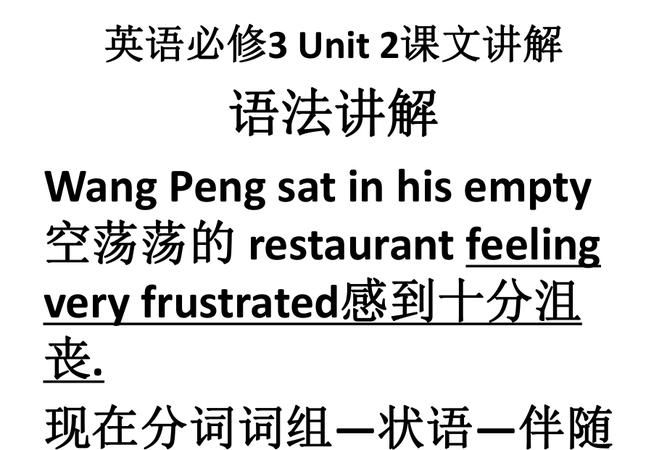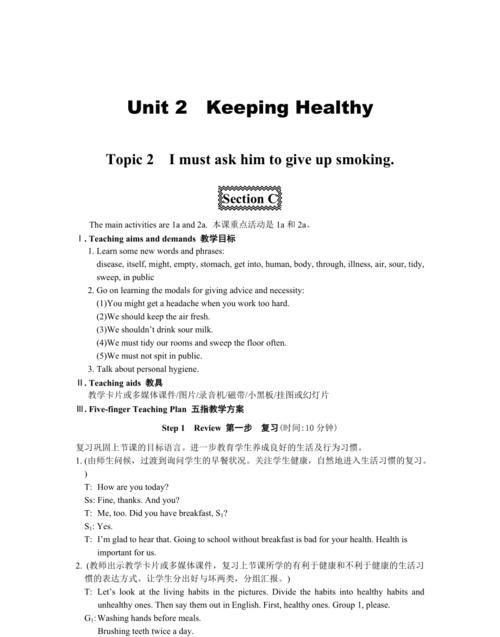本文目录
高一英语必修二语法知识点总结
一. 一般现在时
1. 表示主语现在所处的状态及其所具备的特征、性格、能力等
例如:I am a girl.
2. 表示习惯性、经常性的动作
例如:I usually go to bed at 9:00.
3. 标志性的词语
Always often sometimes now and then
4. 若助于为第三人称单数(he she it)则动词要用单三现
二. 现在进行时
1. 说话时正在进行的动作
例如:I am reading.
2.表示即将发生的动作,多用于go come start leave return arrive stay fly等词语之中,句子中常常有时间状语
例如:The plane is going to Beijing.
3.当句子中出现了always 、forever 、constantly 、continually 、
All the time等
例如:I am always thinking of you.
三. 倍数比较
1.A+系动词+倍数词+as+ adj \adv的原型+as+B
例如:The class is twice as big as that one.
2.A+系动词+倍数词+adj\adv的比较级+than+B
例如:The class is twice bigger than that class.
3.A+系动词+倍数词+the size\amount(数量)\ength\width\height
\depth\+of+B
例如:The class is twice the size of that class.
四. With的复合结构
1. With+宾语+宾语补足语
宾语补足语根据逻辑意义的不同可以是不同的词语,如形容词、现在分词、过去分词、副词、介词短语、不定式等,with在复合结构中常作状语
2.常用结构
○1with+宾语+doing
表主动与进行
例如:Tom was quite safe with Lucy standing behind him.
○2with+宾语+done
表被动与完成
例如:With all things she need bought,she went home.
○3with+宾语+to do
表将来
例如:With so many thing to deal with.
五. 现在完成进行时
现在完成进行时
1.基本表达式(I have been doing )
I/ we/ you/ they have been doing sth.
he/ she/ it has been doing sth.
2.表示从过去某时开始一直持续到现在的动作,并且还将持续下去.
The Chinese have been making paper for two thousand years.
中国有2000年的造纸历史.(动作还将继续下去)
I have been learning English since three years ago.
自从三年前以来我一直在学英语.(动作还将继续下去)
3.表示在说话时刻之前到现在正在进行的动作.
We have been waiting for you for half an hour.
我们已经等你半个钟头了(人还没到,如同在电话里说的,还会继续等)
4.有些现在完成进行时的句子等同的句子.
例如:They have been living in this city for ten years.
They have lived in this city for ten years.
他们在这个城市已经住了10年了.
I have been working here for five years.
I have worked here for five years.
我在这里已经工作五年了.
5.大多数现在完成进行时的句子不等同于现在完成时的句子.
例如:I have been writing a book.(动作还将继续下去)
我一直在写一本书.
I have written a book.(动作已经完成)
我已经写了一本书.
They have been building a bridge.
他们一直在造一座桥.
They have built a bridge.
他们造了一座桥.
6.表示状态的动词不能用于现在完成进行时.
例如:I have known him for years.
我认识他已经好几年了.
I have been knowing...
这类不能用于现在完成进行时的动词还有:love爱,like喜欢, hate讨厌,等.
注意:比较过去时与现在完成时
1.过去时表示过去某时发生的动作或单纯叙述过去的事情,强调动作;现在完成时为过去发生的,强调过去的事情对现在的影响,强调的是影响.
2.过去时常与具体的时间状语连用,而现在完成时通常与模糊的时间状语连用,或无时间状语.
一般过去时的时间状语:
yesterday, last week,…ago, in1980, in October, just now, 具体的时间状语
共同的时间状语:
this morning, tonight,this April, now, once,before, already, recently,lately
现在完成时的时间状语
for, since, so far, ever, never, just, yet, till / until, up to now, in past years, always,
不确定的时间状语
3.现在完成时可表示持续到现在的动作或状态,动词一般是延续性的,如live, teach, learn, work, study, know.
过去时常用的非持续性动词有come, go, leave, start, die, finish, become, get married等.
例如: I saw this film yesterday.
(强调看的动作发生过了.)
I have seen this film.
(强调对现在的影响,电影的内容已经知道了.)
Why did you get up so early?
(强调起床的动作已发生过了.)
Who hasn't handed in his paper?
(强调有卷子,可能为不公平竞争.)
She has returned from Paris.
她已从巴黎回来了.
She returned yesterday.
她是昨天回来了.
He has been in the League for three years.
(在团内的状态可延续)
He has been a League member for three years.
(是团员的状态可持续)
He joined the League three years ago.
( 三年前入团,joined为短暂行为.)
I have finished my homework now.
---Will somebody go and get Dr. White?
---He's already been sent for.
句子中如有过去时的时间副词(如 yesterday, last, week, in 1960)时,不能使用现在完成时,要用过去时.
(错)Tom has written a letter to his parents last night. (对)Tom wrote a letter to his parents last night.
六.过去完成时
1. 概念:表示过去的过去
其构成是had +过去分词构成.
那时以前 那时 现在
2. 用法
a. 在told, said, knew, heard, thought等动词后的宾语从句.
She said (that) she had never been to Paris.
b. 状语从句
在过去不同时间发生的两个动作中,发生在先,用过去完成时;发生在后,用一般过去时.
When the police arrived, the thieves had run away.
c. 表示意向的动词,如hope, wish, expect, think, intend, mean, suppose等,用过去完成时表示"原本…,未能…"
We had hoped that you would come, but you didn't.
3.过去完成时的时间状语before, by, until , when, after, once, as soon as.
例如:He said that he had learned some English before.
By the time he was twelve, Edison had began to make a living by himself.
Tom was disappointed that most of the guests had left when he arrived at the party.
七.现在完成进行时
1.其构成形式如下:
I / we / they have been + 动词的现在分词
He / she / it has been + 动词的现在分词 功用如下:
2. 表示一个在过去开始而在最近刚刚结束的行动,如:
Ann is very tired. She has been working hard.
Why are you clothes so dirty? What have you been doing?
3.表示一个从过去开始但仍在进行的行动,如:
It has been raining for two hours. (现在还在下)
Jack hasn’t been feeling very well recently.
4. 表示一个从过去开始延续到现在,可以包括现在在内的一个阶段内,重复发生的行动,如:
She has been playing tennis since she was eight.
5. 现在完成时强调动作行为的结果、影响,而现在完成进行时只强调动作行为本身,如:
Tom’s hands are very dirty. He has been repairing the car.
The car is going again now. Tom has repaired it.
注意:
现在完成时有否定结构、而现在完成进行时没有否定结构. 现在完成时态可表示做完的时期以及已有的经验、但现在完成进行时不可以 现在完成进行时的否定结构 现在完成进行时有时也可用否定结构.
如: Since that unfortunate accident last week, I haven’t been sleeping at all well. 自从上周发生了那次不幸事故之后,我一直睡得很不好.
He hasn’t been working for me and I haven’t has that much contact with him. 他并没有给我工作过,我和他没有过那许多接触.
6.否定句构成:
主语+has/have+not+been+现在分词
7.一般疑问句构成:
Have/has+主语+been+现在分词+其他

新人教版高中英语必修二第三单元语篇类型
必修二
M2 Unit3
重点单词:
revolution
universal
artificial
intelligence
anyhow
totally
advantage/disadvantage
type
disagree
material
personal
create
arise
wander
wonder
predict
devoted
sum
develop
rapidly
memory
shape
network
application
connect
quality
download
internet
virus
web
signal
program
coach
electronic
spoil
niece
expert
finance
mobile
performance
explore
analytical
logically
cheat
operate/operator/operation
calculate/calculator
simple-minded
technology/technological
重点短语
as a result
deal with
have … in common
make up
after all
watch over
be filled with
with the help of
compare …to/with ….
According to
at that time
from then on
Share … with …
as well as
be crazy about
Provide …. With
in a way
重点句子
1.
Over time my memory has developed
so much that …
I never forgot anything
I have been
told.
2.
I was programmed by an operator who uses cards with holes.
3.
At that time it was considered a technological revolution
….
4.
I wondered if I would grow any larger.
5.
Alan Turing, wrote a book about how I could
be made to work
as a “universal machine”
to
solve any difficult mathematical problem.
6.
As time went by, I was made smaller.

高一英语必修二知识点梳理人教版
勤奋学习就是面对学习作业,能一丝不苟的完成;面对学习中的困难,能积极找出困难的原因,勇于克服,不解决困难时不罢休。下面给大家分享一些关于 高一英语 必修二知识点梳理,希望对大家有所帮助。
高一英语必修二知识点1
重点词汇、 短语
survive 幸免,生存,生还 in search of 寻找 select 挑选 design 设计,图案,构思 fancy 奇特的,异样的,想象 decorate 装饰,装潢 belong to 属于 in return 作为回报 at war 处于交战中 remove 移动,搬动 less than 少于 doubt 怀疑 worth 值得的,相当于…的价值 take apart 拆开 explode 爆炸 sink 下沉,沉下 think highly of 高度评价
重点句型
There is no doubt that… 毫无疑问… when 的用法 was/were doing…when… 正在做某事…这时
was/wereabout to do… when…. 将要做某事…这时
had just done…when… 刚做完某事…这时
China is larger than any other countryin the world. (同一范围内的比较)
She runsfaster than any man in Greece. (不同范围内的比较) the way 的用法 The way___ he explained to us was quitesimple. (that/which/省略) The way ___ he explained the sentence tous was not difficult. (that/in which/ 省略) worth 的用法 be (well) worth doing sth (很)值得做某事 be worthy to be dOne= be worthy ofbeing done It’s worthwhile to do sth = it’s worthwhile doing sth “疑问词+ to do” 结构,在句中做主语、宾语、表语 How to do it is a question. I don’t know what to do next. it 做形式主语
It has been proved that pride goesbefore a fall. 事实证明骄必败。 what 引导主语从句,在从句中作主语 What he has said is of great importance.What happened to him remained unknown.
语法 总结
非限定性定语从句 非限定性定语从句的作用是对所修饰的成分作进一步说明(注:通常和主句间用逗号隔开,不受主句结构影响,将从句拿掉后其他部分仍可成立) 限制性定语从句与非限制性定语从句的六点区别 区别一:形式不同
限定性定语从句主句和从句之间不用逗号隔开,口语中使用时也不停顿;而非限定性定语从句与主句之间通常有逗号隔开,口语中使用时有停顿。
区别二:功能不同 限定性定语从句用于对先行词的意义进行修饰、限制和识别,如果去掉,就会造成句意不完整或概念不清;而非限定性定语从句用于对先行词起补充说明作用,如果省略,句意仍然清楚、完整。如: People who take physical exercise livelonger.
进行体育锻炼的人活得长些。(若把从句去掉 句子 就失去意义) His daughter, who is in Boston now, iscoming home next week.
他女儿现在在波士顿,下星期回来。(若把从句去句子意义仍然完整) 区别三:翻译不同 在翻译定语从句时,一般把限定性定语从句翻译在它所修饰的先行词之前,而把非限定性定语从句与主句分开。如: He is the man whose car was stolen.
他就是汽车被窃的那个人。 I’ve invited Jim, who lives in the nextflat.
我邀请了吉姆,他就住在隔壁。 区别四:含义不同 比较下面的两个句子: I have a sister who is a doctor.
我有一个医生的姐姐。(姐姐不止一个) I have a sister, who is a doctor.
我有一个姐姐,她是当医生的。(只有一个姐姐)
区别五:先行词不同 限定性定语从句的先行词只能是名词或代词,而非限定性定语从句的先行词则可以是名词或代词,也可以是短语或句子;
另外,当先行词为专有名词或其他具有独一无二性的普通名词时,通常要用非限制性定语从句,而不用限制性定语从句。如: Peter drove too fast, which wasdangerous.
彼得开车很快,这是很危险的。(which 指 drive too fast) He changed his mind, which made me veryangry.
他改变了主意,这使我很生气。(which 指整个主句) 区别六:关系词不同 关系词 that 和 why 可用于限制性定语从句中,通常不用于非限制性定语从句;
另外,在限制性定语从句中,关系词有时可以省略(参见本章有关内容),而在非限制性定语从句中关系词一律不省略。
高一英语必修二知识点2
重点词汇、短语
compete 比赛,竞争 take part in 参加,参与 stand for 代表,象征,表示 admit 容许,接纳,承认 as well 也,又,还 host 做东,招待,主人 replace 代替 charge 收费,控诉 in charge 主管,看管 advertise I 做 广告 ,登广告 bargain 讨价还价,讲条件,便宜货 one after another 一个接一个地 deserve 应受(报答或惩罚) deserve 的用法 deserve to do sth 应该做/值得做 deserve doing = deserve to be done 值得… (doing 表被动意义)
Your suggestion deserves to be cOnsidered= deserves considering. ( 用法相似的动词:need/want/requiredoing= need/want/require to be done 需要….) take part in : 参加有组织的、重大的活动
join in 参加正在进行的活动
join: 参加团体,党派和组织,成为其中的一员(jointhe army; join the party) attend: 出席,参加,后跟 meeting,wedding,class,course 等
重点句型
nor/neither + 助动词/be/情态动词 + 主语:表示“…也不这样” I have never been abroad, andneither/nor has he.
If you don’t go to the party, nor willI.
So+情态动词/助动词/be 动词+主语:表示“...也是的一样的”, 强调后者同前者肯定情况一样。
So+主语+情态动词/助动词/be 动词:表示 “的确如此”,对前面情况的肯定。
not only…but (also)… 不但...而且...
Women are not only allowed, but play avery important role in gymnastics.
引导并列结构:引导主语时,谓语动词 就近原则。
引导并列句时,not only 句倒装,即前倒后不倒。
Not only did they take photos, but alsothey had a bid dinner.
语法总结
被动语态 一. 概念:主动语态表示主语是动作的执行者,被动语态表示主语是动作的承受者。 二. 各种时态被动语态的形式 一般现在时的被动语态
am/is/are + done 一般过去时的被动语态
was/were + done 一般将来时的被动语态
will bedone is/am/are going to be done 现在进行时的被动语态
is/am/are + being + done 表示说话人说话时或现阶段正在进行的动作,经常和时间副词 now (现在), right now (现在, 此刻), at present (现在,目前), at this moment (此刻)连用。
5.现在完成时的被动
have/has been done
现在完成时常与 already,always, often, ever, never, yet, not...yet, just 等不表示明确的时间副词连用, 还可以和表示时间一直延续到目前的带(ever )since, for 的状语及包括现在在内的词连用。
如: now, today, this month, this year, recently, these days,many times, so far, by now, in the past/last few days/years… 等。
过去完成时的被动 had been done 过去将来时的被动 would be done 过去进行时的被动 was/were being done 带情态动词的被动语态 情态动词 + be done 动词不定式的被动式 to be done 例:It is an honor for meto be asked to speak here.
三. 注意事项 并不是所有动词都有被动语态
happen, take place, break out, belongto, cost, last 等不及物动词或词组无被动语态。 短语动词、固定搭配变被动语态介词或副词不能省。 例:Time should be madefull use of. 双宾语:一个宾语成主语,另一主语保留不变。 例:Mother will buy me aniphone5. → I will be bought an iphone5 (by my mother) .
→ An iphone5 will be bought for me (bymy mother)
高一英语必修二知识点3
重点词汇、短语
solve 解决;解答 from…on 从…...时起 as a result 结果 so…that 如此…以至于 explore 探索,探测,研究 anyhow 无论如何,即使如此 goal 目标,球门,得分 human race 人类 signal 发信号,信号 type 类型,打字 in a way 在某种程度上 arise 出现,发生 with the help of 在…...的帮助下 electronic 电子的 deal with 处理 watch over 看守,监视 rise/arise/arouse/raise 的区别 单词 词性及意义 过去式 过去分词
现在分词 arise (vi. )出现,发生 arose arisen arising arouse (vt. )唤醒,激起
aroused
aroused arousing
rise (vi. )升起,上升 rose risen rising raise (vt. )举起, 饲养 raised raised raising
重点句型
1. certain 和 sure 的句型 sb. be sure/certain of…= sb. besure/certain that 从句:
某人确信… besure/certain to do sth.
肯定会做… It’s certain that 从句肯定会 例如:It’s certain thathe will succeed.=He’s sure/certain to succeed.他肯定会成功的。 I’m sure/certain of his success.= I’msure/certain that he will succeed.
我确信他会成功的。 2. 主语+ be + adj + to do
Thequestion is easy to answer.
状语从句的省略 在 when, while, if,unless, though, once 等引导的状语从句中,如果从句的主语和主句的主语一致, 且从句中的谓语含有be 动词时, 为了使句子简洁, 可省略从句中的主语和 be 动词。
While playing in the snow, the twopandas had great fun. Unless invited, he has decided not toattend that activity.
语法总结
现在完成时的被动语态(详见第二单元)
高一英语必修二知识点4
重点词汇、短语
die out 灭亡、逐渐消失 hunt 打猎,猎取 in peace 和平地,安详地 in danger of 在危险中 in relief 如释重负,松了口气 burst into laughter 突然笑起来 protect…from 保护…不受…之害 contain 包含,容纳,容忍 affect 影响,感动,侵袭 pay attention to 注意 appreciate 鉴赏,感激 succeed 成功,接替 employ 雇佣,利用 harm 危害 bite 咬,叮 come into being 形成,产生 inspect 检查,视察 according to 按照,根据 so that 以至于
重点句型
succeed in doing sth 成功的做某事
succeed to sth 继承某事 under construction/discussion 正在被建设/讨论
in use 正在被使用 do harm to sth = be harmful to sth 对…有害
there is noharm in doing sth 做某事无害 be used to do sth 被用来做… used to sth 过去常常做... be used to doing sth 习惯于做某事 It won’t be long before… 过不了多久…就会… take measures to do sth 采取 措施 做某事 with 的复合结构:
with + n/pron + adj/adv/ 介词短语/现在分词/过去分词/ 不定式 With a lot of problems to settle, shecan’t go out. (将来)
With time going by, he is getting alongwell with his English. (主动,进行)
With the workdone, he can go out. (被动完成)
语法总结
现在进行时的被动语态(详见第二单元)
高一英语必修二知识点5
重点词汇、短语
roll 滚动,摇晃,卷, dream of 梦见,梦想 to be honest 实话说 attach 系上,附加 attach …to 认为有……(重要性、意义) form 组成,形成,构成 earn 赚,挣得 perform 表演,执行,履行 in cash 用现金,有现钱 play jokes on 戏弄 rely on 依赖,依靠 be/get familiar with 熟悉 or so 大约 break up 打碎,分裂 in addition 另外 sort out 分类
above all 最重要,首先
重点句型
dream of/about 梦想做… to be hOnest= honestly speaking = totell the truth 说实话 form the habit of... 形成…习惯 in the form of… 以…形式 4. I would appreciate it if… 如果…我将不胜感激. go wrong 出故障 come up with 提出 make up 构成;
as is often the case 情况通常如此 6. It looks as if it is going to rain.(真实语气:很有可能发生) He treats me as if I were a stranger. (虚拟语气:与现在事实)
He talked about Rome as if he hadbeen there before. (虚拟语气:与过去事实相反)
语法总结
prep+which/whom 引导的定语从句
关系代词在定语从句中作介词后面的宾语时,有时可把介词提到关系代词的前面,但这时如果先行词是人,要用“介词+whom”引导定语从句;如果先行词是物,要用“介词+which”引导定语从句。且关系代词都不能省略。
例:
The girl whom I borrowed the bikefrom is my friend. The girl from whom I borrowed the bikeis my friend. How is the film about which I oftentalked to you? Is this the room in which Mr. Smithlives? 注意:一些固定的含有介词的短语动词在定语从句中不能拆开,即不能把介词放关系词前。
This is the bag which he is looking for.
The old lady whom she is looking afteris her teacher.
高一英语必修二知识点梳理相关 文章 :
★ 高一英语必修二知识点总结
★ 高一英语必修二unit1知识点
★ 高一英语必修二unit2知识点
★ 高一英语必修一必修二知识点总结
★ 高一英语必修二Module4期末复习检测试题及答案
★ 高一英语必修二各单元作文
★ 高一必修二英语作文
★ 高一英语必修二作文
★ 高中英语必修二各单元单词表(2)
★ 高中英语必修二各单元单词表

高一英语必修二电子单词表
单词和 短语 的 学习 方法 大同小异,积累是王道。下面我为大家带来 高一英语 必修二Unit3重点短语,欢迎大家学习!
高一英语必修二Unit3重点短语:
1.in common 共同的
in common with 和…一样
We have much/a lot /nothing /little/something in common.我们有很多/没有/几乎没有/有一些相似之处。
2.put… in order把…排序
in order按顺序; 整齐
out of order次序紊乱;(机器等)失灵; 出故障
3. compare …with…把…与…想比
compare …to… 把…比作…
compared with与…想比
4. over time 久而久之
5.begin as作为…开始
6. technological revolution科技革命
7. from then on. 从那时起
from now on 从现在起
8. artificialintelligence 人工智能
9. in size and in brainpower 在体积和脑容量上
10.as a result结果as a result of作为…的结果
11. go by(时间)流逝,过去 pass by经过
12. human beings, humanrace, mankind人类
13. provide sb. with sth.= provide sth. forsb.给某人提供某物
14. a life of high quality高质量生活
15. in reality事实上
16. be crazy about…痴迷于,醉心于
17. do research into 进行…的研究
18.have a good shot for a goal. 好好地射一个球
19. a devoted friend一个忠实朋友
20. be connected with …与…有联系
21. get together 聚会
22.make up 组成,构成
be made up of由…组成;编造;弥补
make up for;化妆
23.in the early 1960s在20世纪 60 年代早期
24. on the football team在球队中
25. come true 实现,达到
My dream comes true.我梦想成真。
realize one’s dream 实现梦想
26. in a way=in one way=in some ways从某种程度上说,从某些方面来说
in the/one’s way挡路,碍事
on the/one’s way to …在去…的路上
in this way用这种方法
by the way 顺便提一下
by way of London 途经伦敦
loseone's way 迷路, 迷失方向
in no way绝不
27. after all毕竟,终究
in all=in total总共
above all尤其重要的是,首先
firstof all首先,起初
notat all根本不,一点也不
all in all 总之
28. by Oneself=on one’s own独自
29. watch over 看守,照管,监视
30.mobile phone手机
31. with the help of在…的帮助下
32. what’s more=inaddition 更重要的是,而且,另外
33. be filled with充满
高一英语必修二Unit3重点短语相关 文章 :
1. 人教版高中英语必修三重点短语
2. 英语必修二Unit 3 Computers单词及语言点总结
3. 高一必修3重点英语单词
4. 高一英语unit3知识点总结
5. 高一英语必修三知识点

以上就是关于英语必修二unit3课文语法,高一英语必修二语法知识点总结的全部内容,以及英语必修二unit3课文语法 的相关内容,希望能够帮到您。

